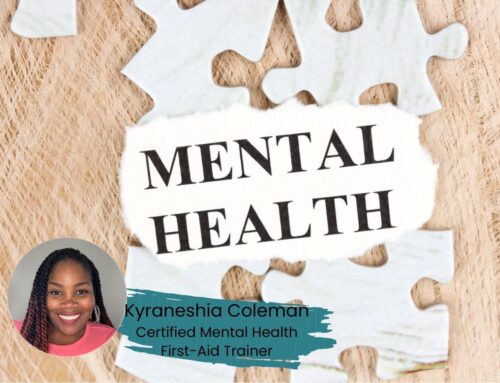Latinos are Encouraged to Adopt Heart-Healthy Habits to Reduce Increased Risk for Dementia. Here are 5 Ways Community Health Workers Can Help.
May 2019
A recent study conducted by UC Davis discovered alarming differences in the causes of dementia among people of different ethnicities. Studying donated brain tissue from 423 individuals who had died after a dementia diagnosis, researchers discovered that Latinos were more likely to also have heart and blood-related issues than other ethnicities.1 These findings have led health professionals to the startling realization that if you are Latino and suffer from hypertension or diabetes, you’re at higher risk for dementia.2
As physicians across the country struggle to tackle this, it is crucial that more Latino households adopt heart-healthy habits.
Latinos are the second fastest growing ethnic group in the US.3 It is scary to think about how more than 50% are expected to develop type 2 diabetes in their lifetime4 and the implications that has on dementia diagnoses. When it comes to addressing chronic diseases related to heart health, like diabetes, Latinos often face many challenges:
- About 1 in 3 Latinos have limited English proficiency6 in an English language dominated health care system. According to a study conducted by the Associated Press-NORC Center for Public Affairs and Research, nearly 6 in 10 Latino adults have had difficulty communicating with a health care provider because of language. 8
- About 1 in 4 Latinos live below the poverty line6 which makes things difficult when it comes to finding affordable care.
- Latinos are less likely than non-Hispanic Whites to engage in healthy lifestyle behaviors like eating fruits and vegetable and engaging in physical activity.7
In areas where there are many low-income Spanish speaking families, like the colonias of the border towns in Texas, large grocery store chains that sell fresh produce are many miles away. In these areas, public transportation is virtually non-existent, and families must shop from places that sell highly processed foods like convenience stores.
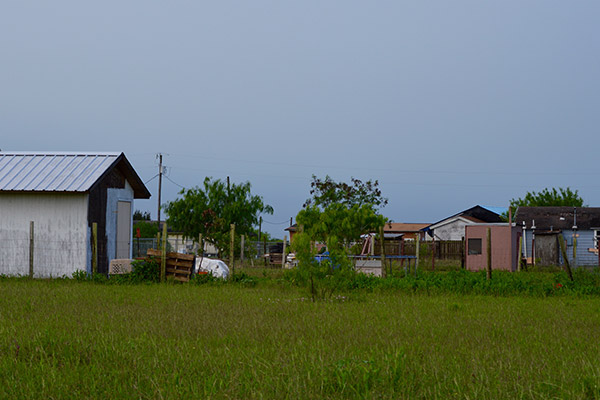
Many of MHP Salud’s direct service programs operate inside the Rio Grande Valley’s colonias, which are defined by The Texas Office of the Secretary of State as residential areas along the Texas-Mexico border that may lack basic living necessities like potable water, septic or sewer systems, electricity, paved roads, or safe and sanitary housing.
Health resources are also often miles away with no connections to public transportation. For the families that can access resources, they face the challenge of finding a provider they connect with culturally and linguistically in a health care system where only 5% of physicians identify as Latino.5
Community Health Workers
Community Health Workers are especially effective at working with hard to reach populations that may have limited access to health resources because they usually come from the community they serve. They have knowledge of the community norms which allows them to reach places other health professionals cannot.
Community Health Workers help communities better understand health information by providing it in their language and giving examples that are relevant to the community culture. And when it comes to heart health, CHWs know how to promote healthy eating habits and exercise activities that families can adopt to fit their lifestyle.
Five Ways CHWs Can Help More Latinos Adopt Heart Healthy Habits
Community Health Worker programs are one of the best ways to help Latinos adopt heart-healthy habits to reduce their risk of diseases like dementia. Here are some more ways they can help:
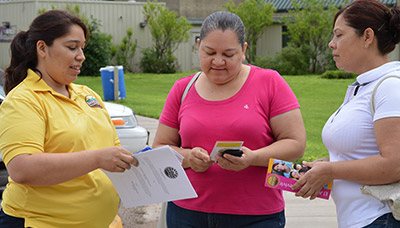
- They provide information and education: In our Community Health Worker-led program, Juntos Podemos, CHWs reach Latino communities by conducting outreach in the colonias, schools and community centers of the Rio Grande Valley on the southern border of Texas. They provide families with health education and information that’s in Spanish and relatable to the cultural experiences they share with the community. For example, they discuss things such as the amount of salt in traditional dishes like Carne Guisada (a traditional stew made with beef) and explain the effects of a poor diet on the arteries and the heart.
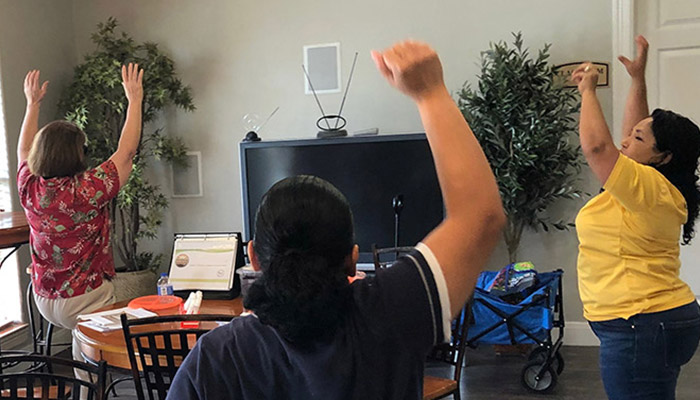
- They establish a supportive structure for an active lifestyle using community resources: During the Juntos Podemos group sessions, CHWs facilitate 15-minute exercise routines that fit the lifestyles of their participants. They teach them low-intensity exercises, like arm lifts, that can be done for free at home or a nearby park. They educate community members on the benefits of an active lifestyle and how it positively impacts the effects of chronic diseases. Those who are involved in the sessions are often so empowered, they establish a daily routine to stay active with their neighbors.

- They provide culturally relevant demonstrations on how to make healthier eating choices: In Vivir una Vida Plena, CHWs organize group sessions in some of the most trusted places in the community like schools and community resource centers. During these sessions, they demonstrate how busy, hard-working families can make affordable healthy snacks using local produce and items that they bought at nearby stores. They go even further by explaining how to read the nutrition labels, using foods that are staples for many Latino families as examples.
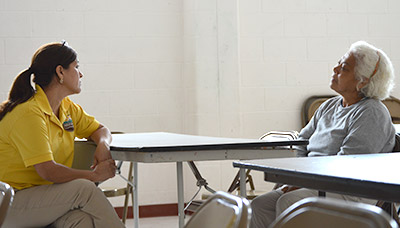
- They help navigate the health care system: For non-English speaking low-income families, our health care system can be intimidating. Trying to enroll in the insurance marketplace can be challenging because of the number of options available. . Many are also concerned that they won’t be able to afford health care. In our Navigator program, CHWs help community members by providing clear information and assisting with applications to get them on a pathway to obtaining affordable health insurance. CHWs help anyone seeking coverage and can help Latinos who suffer from chronic diseases like Diabetes understand their options.
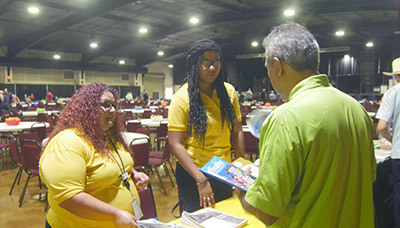
- They encourage individuals to keep up with their health: The advice and care Community Health Workers give allows them to develop meaningful relationships with participants. By building these trusted personal relationships, CHWs can exert greater influence on topics such as the importance of attending appointments or taking prescribed medication.
Free Resources for Community Health Worker-led Programs that Address Heart Health
We’ve used our experience with Community Health Worker programs to develop Community Health Workers & Hypertension and Heart Health Interventions: A Resource for Program Managers and Administrators. It includes approaches that have been successful, a list of external resources and additional information that will be useful to organizations and administrators looking to start or improve a CHW-led hypertension and heart health intervention program.
If your organization is interested in expanding a current program to address heart health or needs more individualized support with starting a CHW-led program, be sure to peruse MHP Salud’s training and consulting services.
About MHP Salud
MHP Salud has over 35 years of experience implementing CHW programs and training organizations looking to start and/or strengthen their own CHW programs. For more information about MHP Salud, our services, and how we can help you, please email us at info@mhpsalud.org.
References
- https://www.sacbee.com/news/local/health-and-medicine/article227439344.html
- https://health.ucdavis.edu/publish/news/newsroom/13670
- https://www.pewresearch.org/fact-tank/2017/09/18/how-the-u-s-hispanic-population-is-changing/
- https://www.cdc.gov/features/hispanichealth/index.html
- https://www.ncbi.nlm.nih.gov/pmc/articles/PMC3105899/
- https://www.pewhispanic.org/2015/05/12/english-proficiency-on-the-rise-among-latinos/
- https://www.ncbi.nlm.nih.gov/pmc/articles/PMC3043172/
- https://www.usnews.com/news/news/articles/2018-07-26/ap-norc-poll-latinos-see-health-care-communication-barriers
- https://www.cdc.gov/dhdsp/docs/chw_brief.pdf




